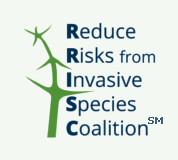Our Goals
- Protect biodiversity on public and private lands and in water bodies by working with state and federal agencies and private landowners to address invasive species that are driving native species to extinction.
- Make noteworthy contributions to protecting America’s biodiversity by reducing risks from invasive species
- Reduce industry operating costs imposed by invasive species damaging private lands and facilities
- Create business opportunities for commercial products and services used to control invasive species
- Reduce the regulatory burden of the Endangered Species Act on American society by addressing invasive species, one of the prime causes of endangerment
- Demonstrate the success of nonregulatory solutions to a nationally significant environmental problem
- Focus public and Congressional attention on a serious environmental problem that can be successfully addressed with practical solutions
- Foster programs in conjunction with and in cooperation with members of Congress who share RRISC’s interest in invasive species risk reduction
- Provide the expertise of a bipartisan Distinguished Advisory Board of recognized national leaders in conservation to help address invasive species
- Recognize RRISC member organizations for their successful best practices that reduce risks from invasive species, and strive to replicate those best practices across the country
Stategies
Education:
- Show how invasives threaten people, the economy, and the environment of every Congressional District
- Provide briefings, workshops, and seminars on invasive species to members of Congress, their staffs, federal agencies, and other audiences, in Washington DC and across the country
- Support the annual National Invasive Species Awareness Week (NISAW) conference in Washington DC
- Promote awareness of the annual President’s budget request for invasive species across all agencies by communicating its composition to Congress and other stakeholders
- Lay the groundwork for a national network of regional early detection and rapid response capabilities by sponsoring multi-stakeholder educational regional workshops around the country, in cooperation with State governments, federal agencies, and land grant universities
Advocacy:
- Cooperate with regional and interstate organizations to promote joint action to address invasive species
- Promote best practices for the control of invasive species by recognizing the most successful efforts of state and local governments, interstate organizations, federal agencies, non-profits, and for profit companies to reduce the risks posed by invasive species
- Cooperate with the US Department of Agriculture’s Animal and Plant Health Inspection Service by promoting more consistent industry compliance with international phytosanitary standards for wood packaging material, to protect American forests from foreign insect pests that are causing severe damage in many regions of the United States.
- Express support for local, state, or federal legislation that will reduce the risks posed by invasive species.
- Provide practical and meaningful recommendations for the federal government’s National Invasive Species Management Plan, emphasizing non-regulatory actions to achieve prevention, and early detection and rapid response
- Encourage Congress to pursue cost-effective non-regulatory legislative and budgetary solutions to invasive species problems
Members:
Westlands Water District of California
(more listings coming soon)
Distinguished Advisory Board:
RRISC is honored to have the following national conservation leaders join our Distinguished Advisory Board:
The Honorable George Frampton, former Assistant Secretary of the Interior for Fish and Wildlife and Parks
The Honorable Tracy Mehan, former Assistant Administrator for the Office of Water at US EPA
The Honorable Gale Norton, former Secretary of the Interior
The Honorable Lynn Scarlett, former Deputy Secretary of the Interior
The Honorable Harris Sherman, former Undersecretary of Agriculture for Natural Resources and Environment
Scientific Advisory Committee:
Chuck Bargeron, Information Policy Director, Center for Invasive Species and Ecosystem Health, University of Georgia
Dr. Thomas Stohlgren, Senior Research Scientist, Natural Resource Ecology Laboratory, Colorado State University
Board of Directors:
 Richard D. Otis, Jr., President of RRISC, is a nationally recognized expert on environmental policy, with a unique understanding of tools and information technology used to drive performance, and, most recently, focused on leveraging these tools to address environmental challenges facing China. Rick can be contacted at rick.otis@rrisc.org
Richard D. Otis, Jr., President of RRISC, is a nationally recognized expert on environmental policy, with a unique understanding of tools and information technology used to drive performance, and, most recently, focused on leveraging these tools to address environmental challenges facing China. Rick can be contacted at rick.otis@rrisc.org
 Stephen Dawson, Counsel for Dawson and Associates, earned a BA from Tulane University and his JD from the University of Baltimore Law School. He recently finished his L.L.M. in Environmental Law at George Washington University Law School. His thesis is on the Environmental Protection Agency’s use of administrative compliance orders for Section 404 permit violations after the Supreme Court’s Sackett v. EPA decision. Steve is a member of the Virginia Bar Association.
Stephen Dawson, Counsel for Dawson and Associates, earned a BA from Tulane University and his JD from the University of Baltimore Law School. He recently finished his L.L.M. in Environmental Law at George Washington University Law School. His thesis is on the Environmental Protection Agency’s use of administrative compliance orders for Section 404 permit violations after the Supreme Court’s Sackett v. EPA decision. Steve is a member of the Virginia Bar Association.
Robert (Bob) J. Johnson is the immediate Past President of the Wildlife  Habitat Council. Bob served 17.5 years with WHC, the last 6.5 as their President. Bob has a BS degree in Physics from Virginia Tech, and an MS in Oceanography from New York University. Prior to joining WHC, Bob worked at the World Bank developing Water Policy, the Air and Waste Management Association, the Tennessee Valley Authority, and the U.S. Environmental Protection Agency, where he focused on estuarine and freshwater resources in the agencies Office of Water.
Habitat Council. Bob served 17.5 years with WHC, the last 6.5 as their President. Bob has a BS degree in Physics from Virginia Tech, and an MS in Oceanography from New York University. Prior to joining WHC, Bob worked at the World Bank developing Water Policy, the Air and Waste Management Association, the Tennessee Valley Authority, and the U.S. Environmental Protection Agency, where he focused on estuarine and freshwater resources in the agencies Office of Water.
Staff:
Alex Hosmar, social media and logistics manager of RRISC, graduated from  The George Washington University with a BA in Economics and Public Policy. He currently consults for the federal government and plans to gain a legal education in the future. Alex’s experience in communications focuses on tailoring digital media resources to the needs of particular firms, which include RRISC, The Earth and Water Group, and Totally Tigers, a blog following the Detroit Tigers.
The George Washington University with a BA in Economics and Public Policy. He currently consults for the federal government and plans to gain a legal education in the future. Alex’s experience in communications focuses on tailoring digital media resources to the needs of particular firms, which include RRISC, The Earth and Water Group, and Totally Tigers, a blog following the Detroit Tigers.





